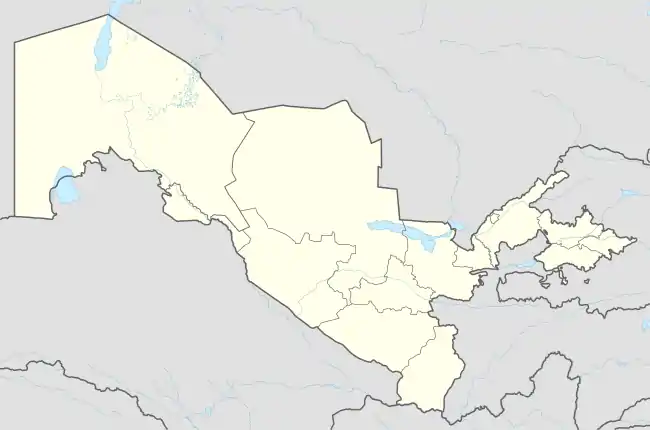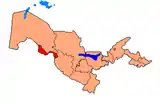Hazorasp
Hazorasp (Uzbek: Hazorasp, Ҳазорасп), also known as Khazarasp (Russian: Хазарасп), or by its more ancient name Hazarasp (Persian: هزار اسپ, meaning "thousand horses"), is a town in Uzbekistan at the head of the Amu Darya delta south of the Aral Sea. It was an important trading center during the medieval period. During its history, the town has been subject to various battles; between the Ghaznavid Sultan Mahmud of Ghazni and the Ma'munid ruler Abu'l-Harith Muhammad in 1017; between the Seljuq Sultan Ahmad Sanjar and the Khwarazmian ruler Atsiz in 1147; and between the Khwarazmian ruler Muhammad II and the Ghurid ruler Mu'izz al-Din Muhammad. The town was finally destroyed during the Mongol invasions.
Hazorasp | |
|---|---|
Town | |
 Hazorasp Location in Uzbekistan | |
| Coordinates: 41°19′N 61°04′E | |
| Country | |
| Region | Xorazm Region |
| District | Hazorasp District |
| Population (2005) | |
| • Total | 16 700 |
| Time zone | UTC+5 (UZT) |
The town was later rebuilt, and only retained some of its importance. It was later a stronghold under the Mongol Arabshahids, and was also used as a residence by the Arabshahid princes. It was captured by the Russians during the Khivan campaign of 1873. The city has survived to present day, and is today a part of Uzbekistan. It was added to the UNESCO World Heritage Tentative List on January 2008, in the Cultural category [1]
References
- "Khazarasp - UNESCO World Heritage Centre". UNESCO World Heritage Centre. Retrieved 25 November 2013.
Sources
- Luzac, & Co (1986). "The Encyclopedia of Islam". The Encyclopaedia of Islam, Vol. III. London: E.J. Brill. pp. 1–1304.

.jpg.webp)